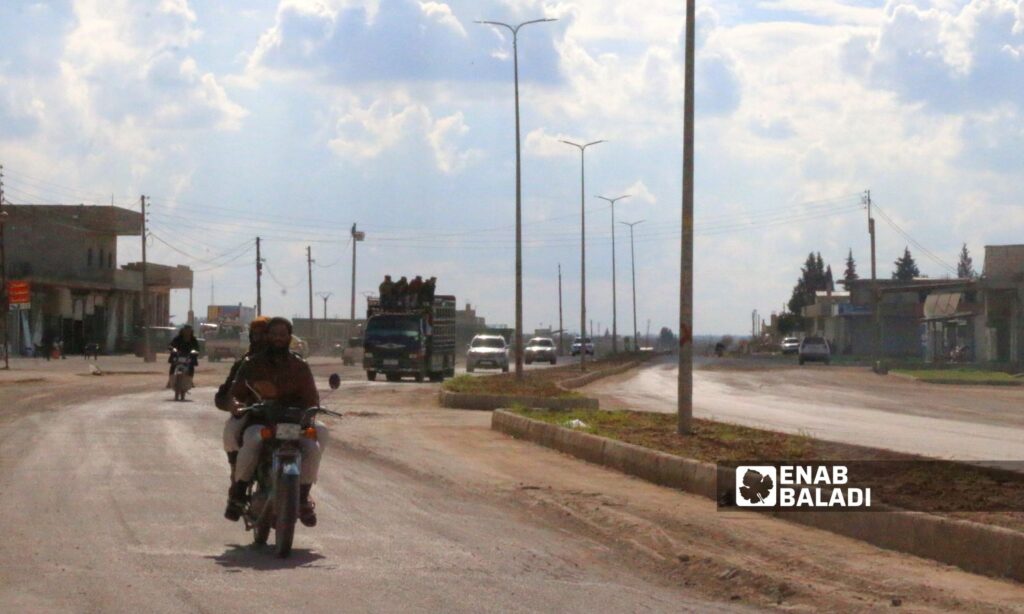Enab Baladi – Ras al-Ain
Dozens of villages around Ras al-Ain, in the northwest of al-Hasakah, are suffering from the absence of public transportation that connects them to the city center, burdening the movement of residents and impeding their daily lives.
Rural residents are primarily dependent on motorbikes and private taxis for travel between the villages and the city center, which costs them hefty sums of money.
The population of the Ras al-Ain area reaches 115,000, and the locals mainly rely on agriculture. Daily wages range between 30,000 and 40,000 Syrian pounds (approximately two and a half dollars).
High costs
Mohammed Jumaa, from the village of al-Manajeer east of Ras al-Ain (located 22 kilometers from the city center), complained about the lack of public transportation connecting his village, like most of the countryside, to the city.
Jumaa told Enab Baladi that he has to go to the city every day to take his son to high school using his motorbike, which requires two liters of gasoline daily, costing 60 Turkish lira (around two dollars).
Jumaa mentioned that the situation becomes more difficult during the winter due to the rugged roads, the abundance of potholes and mud, and that bad weather conditions often force his son to miss school. He also indicated that he cannot afford the costs of renting a private car as an alternative to his motorbike.
Maram al-Ali from the village of al-Nuqra west of Ras al-Ain, said she has a child who suffers from kidney failure and needs dialysis every three days at the Ras al-Ain National Hospital. She has to rent a car for 300,000 Syrian pounds each time she goes to the hospital.
She complained about her financial inability to take her son to the hospital and noted that renting a private car has become a financial burden on her family. She called for the reactivation of public transportation, which was available and affordable five years ago.
Car owners switched to private transport
Over the years, the owners of public transport vehicles stopped working due to the limited geographical space within Ras al-Ain, focused only on distances between the countryside and the city, and turned to private work. Previously, public transport extended to vast areas in the al-Hasakah city before 2019, providing them with a good income.
Farhan al-Maalouf, an owner of a public transport vehicle, said that the public transport drivers stopped working five years ago due to the limited geographical area of the region, especially after Turkey’s military operation “Peace Spring” in 2019, because the area became restricted and not open to other regions.
He explained that the high prices of fuel and spare parts for vehicles led them to stop working completely, making them rely on private transportation. He added that the area is currently considered besieged, and the furthest distance from the city center does not exceed 30 kilometers.
He mentioned that if the relevant authorities supported public car owners by providing fuel and spare parts at acceptable prices, drivers would gradually return to work.
The price of a liter of diesel refined within primitive refineries is 20 Turkish lira, European diesel is 30 Turkish lira, and Turkish diesel is 40 Turkish lira, whereas the cost of refined gasoline is 30 lira per liter, and European gasoline is 50 lira.
Promises to provide public transport
The official spokesperson for the local council in Ras al-Ain, Ziad Maliki, told Enab Baladi that the council is considering providing public transport for residents at cost price in the upcoming period without precisely specifying when.
He clarified that the delay in implementing such projects is due to the focus on more critical projects, such as providing water, rehabilitating roads, and refurbishing public facilities.
He added that the local council’s capabilities are limited and that it cannot solve all problems at once, including the tunnels dug by the Syrian Democratic Forces (SDF), which have caused severe damage to the water and sewage networks. The council is working on their rehabilitation.
Turkey manages the cities of Ras al-Ain and Tal Abyad in northern Syria, and the service institutions there are overseen by the center of Urfa Province in Turkey. The local council supervises the execution of service projects in the city, considered modest compared to those in northern Aleppo province.
Ras al-Ain and Tal Abyad are located along the Turkish border, controlled by the Syrian National Army backed by Turkey. Surrounding them are frontlines with the SDF, with the Turkish border being their only exit to the outside world.

